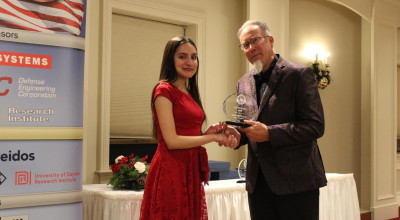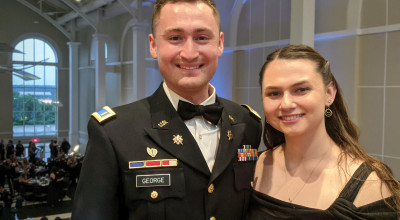
The Defense Advanced Research Projects Agency (DARPA) is coming to Georgia Tech October 25 and 26 to connect with academic and industry innovators with a goal of growing the agency’s community of talent and partnerships. The meeting is part of a series of six events called DARPA Forward being held in key U.S. research and development hubs.

The meeting supports DARPA’s mission to make pivotal investments in breakthrough technologies for U.S. national security. “We defend against technological surprise by creating our own,” said Stefanie Tompkins, DARPA’s director. “In DARPA’s search for transformative solutions, what we worry most about are the ideas we never hear. Ultimately, our goal with DARPA Forward is to reach more ideas, connect with more talent, and generate more surprises.”
The DARPA Forward conference in Atlanta will be held at the Georgia Tech Hotel and Conference Center and will include talks by researchers from Georgia Tech and the Georgia Tech Research Institute (GTRI). Several hundred attendees are expected.
“DARPA funds a lot of great researchers from universities and companies across the Southeast, and we are looking forward to meeting more of them,” Tompkins added. “It’s hard to predict what new ideas the confluence of smart people and a unique geographic perspective can bring to national security problems, but we expect them to challenge our thinking and help us create that technological surprise that is core to our mission.”
DARPA is perhaps best known for creating the ARPANET, designed as a fault-tolerant computer network that evolved into today’s internet. The agency plays a key role in the nation’s science and technology ecosystem, which includes government, industry, and academia, Tompkins noted. “Collectively, that ecosystem advances technology, usually at a pretty steady pace,” she said. “DARPA’s programs, when successful, disrupt that pace, and provide results that change everyone’s understanding of what is possible.”
The agency funds teams – many of them multidisciplinary – to address its mission-focused goals. “Though the roles can differ for any given problem, we typically see the most exploratory research coming from universities, the technical maturation and engineering from industry, and the mission expertise and test and evaluation support from the government,” she said. “All of those elements can come together in a single DARPA program with the potential to deliver a breakthrough technology for national security.”
At Georgia Tech, DARPA has funded nearly two dozen projects over the past three years. Among them:
- A project aimed at demonstrating a hybrid computing system that will combine the advantages of classical computing with those of quantum computing to tackle some of the world’s most difficult optimization problems.
- Research into using a matched filter technique – similar to what is used to analyze signals returned to radar systems – that uses electrical signals within living cells to predict molecular binding events. The work could have initial applications to the disease cystic fibrosis.
- A project aimed at developing a system that would continuously monitor building air for the SARS-CoV-2 virus that causes COVID-19 and sound a warning to building occupants if it is detected.
Among the speakers is Renee Wegrzyn, the newly-named director of the Advanced Research Projects Agency for Health, also known as ARPA-H. Wegrzyn holds a Ph.D. and bachelor of science degree in applied biology from Georgia Tech and will give a keynote talk on Wednesday, October 26.
Six Georgia Tech researchers are part of the agenda for DARPA Forward in Atlanta. Among them are Georgia Tech College of Engineering faculty members Philip Santangelo, James Dahlman, Gabe Kwong, and Mark Styczynski, who will present on the development of mRNA encoded antibody and CRISPR-based therapies for treating and preventing viral infections and low-cost approaches to ultrasensitive pathogen detection.
Georgia Tech Research Institute (GTRI) Principal Research Engineer Dana Fitzgerald will discuss cognitive electronic warfare (EW), a research area producing autonomous adaptive EW systems with behaviors, processing, and emissions that optimize operation in the presence of novel electromagnetic emissions. Ronald Arkin, professor and director of the Mobile Robot Laboratory in the Georgia Tech College of Computing, will discuss the ethical, legal, and societal implications of decision-making for autonomous systems.
The keynote address on Tuesday, October 25, will be given by Heidi Shyu, Under Secretary of Defense for Research and Engineering, U.S. Department of Defense.
DARPA Forward events have already been held at Colorado State University and the University of Washington, and will also take place in early October at The Ohio State University, in November at Texas A&M University, and in December at the University of California at San Diego.
“For each of the DARPA Forward events, we’ve crafted agendas that are meant to give our audience a taste of DARPA – the technical conversations and arguments and challenging of assumptions that we are immersed in every day,” Tompkins said. “Since we spend a lot of time at the intersections of technical communities, we’ve encouraged people to stick around for talks or panels outside their areas of expertise to see whether it ignites some new idea or approach. This seems to have worked well at the first two events, and we are looking forward to even more energy and more new ideas in Atlanta.”
For more information on DARPA Forward, visit forward.darpa.mil.
Writer: John Toon (john.toon@gtri.gatech.edu).
GTRI Communications
Georgia Tech Research Institute
Atlanta, Georgia USA

About GTRI: The Georgia Tech Research Institute (GTRI) is the nonprofit, applied research division of the Georgia Institute of Technology (Georgia Tech). Founded in 1934 as the Engineering Experiment Station, GTRI has grown to more than 2,800 employees, supporting eight laboratories in over 20 locations around the country and performing more than $700 million of problem-solving research annually for government and industry. GTRI's renowned researchers combine science, engineering, economics, policy, and technical expertise to solve complex problems for the U.S. federal government, the state, and industry. For more information, please visit www.gtri.gatech.edu.





